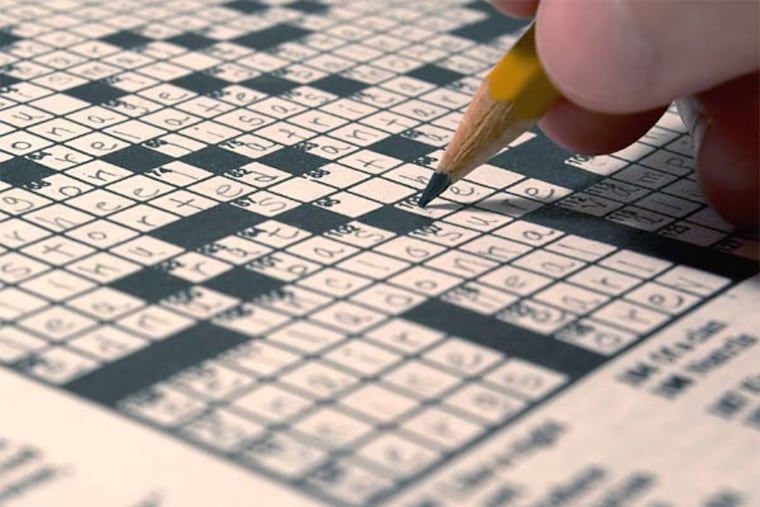The crossword puzzle at 100: A talk with Merl Reagle, puzzle man
One hundred candles for the crossword puzzle! One hundred cheers! The crossword, which has delighted, stimulated, exhausted, and frustrated millions of men and women, turns 100 years old Saturday.

One hundred candles for the crossword puzzle!
One hundred cheers!
The crossword, which has delighted, stimulated, exhausted, and frustrated millions of men and women, turns 100 years old Saturday.
To commemorate, we thought we'd ask - how does the mind of a crossword maker work?
We picked the brain of one of the country's better-known puzzle-masters, Merl Reagle, whose Sunday crossword is syndicated in more than 50 newspapers, including The Inquirer.
His new book is titled, aptl;y enough, Merl Reagle's 100th Anniversary Crossword Book (Puzzleworks, 80 pages, $12.95).
How does the mind of a Merl Reagle work?
"You have to love words and a playful turn of mind," said Reagle, 63, who was born and raised in Audubon, N.J. "What I do is think of something humorous about language, about how it's structured or set up."
Take the words we use to describe that odd and amusing Thanksgiving tradition, the president's "pardoning" of a turkey.
"We pardon a turkey?" Reagle asked during a sit-down Thursday at the Omni Hotel in Center City. "Pardon them for what?" Reagle's voice rose an octave or two.
"Why this terminology? Did he commit crimes? Turkey crimes?"
That series of ruminations, Reagle said, led him to construct an entire puzzle.
"All the words were about bird crimes," he said. "Like robin banks, Illeagle, selling beer to miners."
Reagle, who moved to Tucson, Ariz., as a teenager and graduated from the University of Arizona, pointed to his head with a look of mock despair, a gesture that seemed to say, "Yeah, that's where this stuff comes from."
So what kind of mind does it take to make crosswords?
"It takes a certain temperament. I don't like to be out front very much, never wanted to be a comedian. I'm happy staying behind the scenes," Reagle said. "Having a sponge-head helps, where you just absorb every useless piece of information."
Didn't he need to engage in great intellectual exercises to become a puzzle constructor?
Yes, he said - if you count as "intellectual exercise" watching hours and hours of Tex Avery cartoons.
"Part of the reason I am what I am is because of a lifetime watching cartoons, comedians, and TV," Reagle said.
"Oh, and I guess I can think pretty well."
Reagle began solving crosswords pretty much as soon as he could read. He constructed his first crossword when he was 6.
"I was into building things, Tinker Toys, Lincoln Logs," he said. "One day I discovered you could link words together. I was fascinated by how you could hook them together in such a solid way."
Not long after, he declared crosswords would be his life.
"Every Friday my dad would take me to the Berlin Auction . . . it's this long flea market," Reagle said.
"They had a table with a stack of Sunday Inquirers on them. I said, 'I'm going to do the puzzle in that paper one day,' " said Reagle. "I was 10."
At 16 he sold his first crossword to the New York Times.
Reagle is as enthusiastic discussing the history of puzzles as he is about the process of making them.
The crossword was invented in 1913 by New York World journalist Arthur Wynne. It appeared on Dec. 21. The first clue read, "What bargain hunters enjoy." (Answer: SALES.) The Liverpudlian had moved to America because his father, a lifelong newspaperman, forbade him from entering the profession, Reagle said.
"Everyone thought crosswords would be a fad," he said. "The newspaper's owner refused to register the rights."
Here we are a century later, and the puzzle is still with us.
"Only something like 7 to 10 percent of people do them," Reagle said, "but they're still here."
Crosswords reportedly are the most popular word game in the world.
And is that world a better place since the puzzle was invented?
"The fact that it exists in so many languages is a good thing," said Reagle, who lives in Tampa, Fla., with his wife and publishing partner Marie Haley.
"Language is the key to everything in life. Wars are started depending on how you phrase things. And so puzzles are a great way to start bringing people together."
World peace - one clue at a time.
215-854-2736